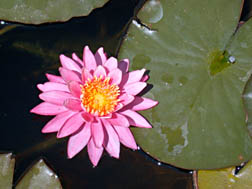|
July 22, 2004
Pond plantsby AMY STEWART I'VE NEVER BEEN INTERESTED IN
POND PLANTS or water gardening of any kind myself, but my mother
has had a small pond in two different gardens over the years.
Often when I call her on the weekend she says, "I can't
talk now. Today's the day I have to clean the pond." She
says it with such dread, and really, it sounds like messy, scummy
work. So when my dad called to ask me for advice about revamping their garden, I said, "Why don't you get rid of that pond? It sounds like Mom's sick of it, and there are so many other things you could do with that space." He paused and said, "Your mother has a complicated relationship with that pond. She complains about it, but she doesn't really want to take it out. It's sort of a love-hate thing." So ponds remain a mystery to me. But I was happy to trot out to McKinleyville last weekend to meet Patti and Doug Rose, owners of Rosepond Aquatics. They've been selling water lilies and other pond plants to nurseries and directly to customers at local farmers' markets for three years. "I've been interested in aquariums and ponds ever since I was a kid," Patti told me. "I've always tried to have a pond everywhere I lived -- even if it was a plastic kiddie pool, I had something where I could grow pond plants." Now she has a couple of good-sized ponds in the garden behind her home, alongside several aboveground, rectangular ponds where she grows water lilies for the nurseries and farmers' markets. She also grows a wide variety of other plants that do well in soggy ground or completely submerged in water. It's a surprisingly diverse group of plants, from society garlic and cardinal lobelia, to cannas and marsh marigolds. In addition to selling plants, Patti sometimes helps customers bring faltering ponds back to life. "A pond is a living thing," she says. "It takes ongoing care, and if it's having problems, you can't just add a chemical and have it looking great tomorrow. It can take a while." Her husband Doug Rose also pointed out the importance of deciding ahead of time what purpose the pond will serve. "Some people put in a pond because they want a place that contains pure, clear water. Well, for that you want a reflecting pool or a fountain. A pond's going to have algae and plants growing in it. People don't realize at first how much goes on in a pond." One of the biggest mistakes people make, Patti said, is making the pond too shallow. "It needs to be at least 2 feet deep," she said, "and water lilies will do well in a pond that's 3 to 4 feet deep." She sells her lilies in 2-gallon pots that are already flooded so that the lilies float on top. "Just sink one of these right down to the bottom of the pond, in the pot just like it is, and within three days the lilies will have grown to the surface," she said. "It's amazing." She also sells smaller water lilies that do well in containers like whiskey barrels. The Roses sell hardy lilies in a wide range of colors, including white, yellow, peach, pink and red. "You can't grow a lotus or a tropical lily up here," she said, "but the hardy lilies do just fine. They can even tolerate a freeze. If the surface of the pond freezes, but the lily's rhizome down at the bottom of the pond doesn't freeze, it'll make it through the winter." Because lilies naturally grown at the bottom of a slope, where water runs downhill and collects nutrients as it goes, they need to be fertilized regularly. She uses a time-release fertilizer in tablet form that she can push into the soil and cover well, which helps keep the nutrients in the soil where the lilies need them. In addition to fertilizing, water lilies need to be repotted every two or three years. "They like that heavy, clay soil," she said. (Finally, a use for it!) "I tell people to dig down deep in their garden and just get some of that ordinary heavy soil. You don't want to buy potting soil for these lilies." She suggests moving them up to larger plastic pots or using plastic dish tubs or storage totes. She also recommends mosquito fish or a natural, Bt-based mosquito control (that's Bacillus thuringiensis, a naturally occurring bacteria that organic gardeners use for some types of pest control) called Mosquito Bits. And then there's the dreaded cleaning. "Well, they do need to be cleaned," she says cheerfully. "Everything at the bottom of the pond rots, and that generates ammonia, so you do need to get in there and clean that out, but it's not so bad." As we sit around her patio table, a dragonfly drops by to lay eggs on a water lily leaf. A brilliant orange koi rises to the surface and nibbles on another plant. "They like to eat the lilies," she says, "but I don't mind." Another complicated pond relationship. Visit Patti and Doug online at www.rosepond.com, or call 839-0588 to find out more. You can find their plants at A&L Feed, Miller Farms, Mad River Gardens and Pierson's. They're also at the Arcata Farmers' Market on the first and third Saturdays of the month, and at the Henderson Center market on the Thursdays before the first and third Saturday. garden-related announcements and news to Amy Stewart. IN THE NEWS | COVER STORY | PUBLISHER | THE HUM | PREVIEW | CALENDAR © Copyright 2004, North Coast Journal, Inc. |


